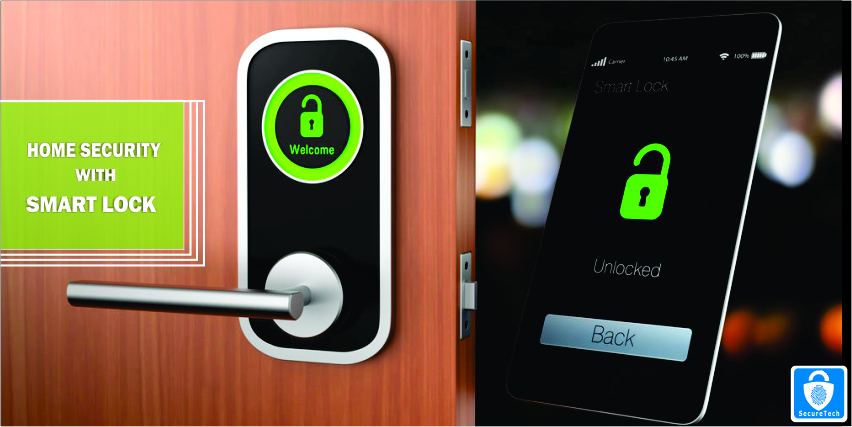
There are hundreds of smart home security devices/gadget available in the market today and the variety of options can sometimes seem overwhelming. You’ve got everything from security cameras to doorbell cameras, window and door intrusion sensors to motion detectors.
What all of these devices have in common is that they can work together to make sure your home, loved ones, and possessions are safe and secure.
Door you know what a Smart Lock is?
So, let’s start at the beginning by define what a smart door lock is.
A smart door lock is a lock that has more sophisticated locking system than the traditional key and tumbler lock. The smart lock comes in different types such as the Keypad, fob enabled, wireless, and biometric. Smart door locks can connect to a network and be controlled remotely from a smartphone or computer interface from anywhere in the world.
This is a very straightforward and simple definition, so let’s dig a little deeper and see how smart door locks can be an important part of a home security system.
Smart Door Locks and Data Logging
Smart door locks can record when someone unlocks or locks a door. They can tell us who entered or exited and when. They can also report if the door or lock itself was tampered with. More interestingly, smart door locks can connect to various services and security systems.
Smart lock can interact and communicate with other related devices. Eventually, smart door locks will be able to incorporate a lot more data and intrusion detection. They will become an integral part of a home or business security protocol.
Smart door locks also play a major role in access control systems, especially in small and medium sized businesses.
The Features and Benefits of a Smart Door Locks
Whether you’re a commercial business or regular consumer, those features and benefits will evolve and change as technology continues to evolve and change.
Smart door locks are still very much in their infancy, and I don’t think we’ve even begun to explore the possibilities of these smart devices.
What Types of Smart Door Locks Are There?
When it comes to choosing what type of smart door lock to purchase, there are several options available. Some are going to be more sophisticated than others based on your particular needs.
Let’s go over the different types of smart door locks.
Keypad and Combination Locks
Keypad and combination locks are the more basic type of smart lock. They’ve been around the longest. These are the types of locks that have the number keypads on the front.
Instead of a key, a combination code can be entered into a keypad to unlock the door. The (Paxton key pad) is a great example of a keypad smart door lock. Keypad and combination locks are also going to be the most affordable type of smart door lock.
Keyless and Wireless Locks
Keyless and wireless locks are becoming the hot. These locks are typically app-enabled so you can lock or unlock your front door from your smartphone, once you download the manufacturer’s app.
Fob Enabled Locks
Fob enabled locks are the kind of lock you will find in an access control system for a large business. They are by far the best type of lock for granular access control.
Fobs will come in the form of an ID card or a key fob. Whatever shape they may take, fobs have a built-in radio-frequency identification (RFID)tag. When a lock pad senses the RFID tag, it sends the tag information back to a server to see if that fob is allowed to unlock that specific door.
These types of locks do require a large amount of networking and programming. The upfront and maintenance costs are more expensive than other types of locks. These locks are also one of the most secure, however.
Fingerprint and Biometric Locks
Fingerprint and biometric locks are similar to fob enabled locks. Instead of using a fob to gain access, a fingerprint or face is used.
Biometric locks, like the (Bern IoT DoorLock), typically use either the face or the fingerprint to gain access into the building.
These types of locks tend to be on the expensive side, and they can be much more difficult to set up and install, but if you need a smart lock that is really hard to bypass, this might be the way to go.
Which Doors Should I Install a Smart Door Lock On?
A smart door lock can be retrofitted onto any door where a traditional lock has been installed. But that doesn’t mean you need a smart door lock everywhere in your home or business. So, where does it make sense to install one?
The obvious choice is the front door. This is the main point of access and the features and benefits of smart door locks make installing one on a front door common sense.
Do you need a smart door lock on a bathroom door? Probably not.
However, if you have a home office, it may make sense to install a smart door lock on that door. A home office could require many different people to have access. And, if you run a business out of your home, you may be legally required to have good access control on the interior door – such as a medical billing company, for example.
Sliding doors and garage doors are also good places to install smart door locks since both doors can allow access from the outside of the dwelling.
How Do Smart Door Locks Connect?
To have read this articles to this part, we guess you’ve decided to buy a bunch of smart door locks, and now you need to know how to connect them.
Some smart door locks can be hardwired, but those you would typically find for commercial use only. Smart door locks for residential use are most often connected with some sort of wireless technology.
Let’s go through a quick run-down of these wireless technologies and how they’re typically used with smart door locks.
WIFI
Wi-Fi is by far the most common and recommended way to connect to a smart door lock. Everyone has Wi-Fi in their house nowadays. Wi-Fi allows smart door locks to connect to the internet and from there connect to an app on your smartphone. This gives you the ability to control the lock even when you’re away from home.
BLUETOOTH
Smart door locks don’t use Bluetooth for data connectivity as much as they do for authentication. Think of it as a wireless key. Sure, you can use a Bluetooth connection on your phone to connect to and set up a smart lock, but that is not it’s the primary purpose. Its power is in authentication.
Each Bluetooth device has a specific ID. No two devices have (or at least shouldn’t have) the same ID. So, you can train a Bluetooth enabled smart lock to automatically unlock or lock a door when your phone is nearby. Of course, this is only one example of its uses.
3G/4G – MOBILE CONNECTIVITY
3G and 4G (and soon 5G) equipped smart door locks are very similar to Wi-Fi enabled locks. The advantage of a smart door lock with mobile connectivity is that they can be used in more remote places, like a barn or a cabin where you don’t have Wi-Fi. The disadvantage is that with this feature, they are more expensive and typically have a subscription fee attached to them.
Smart Door Locks Keep You and Your Loved Ones Safe and Secure
Smart door locks are just one of the many smart home security devices available today. They are similar to conventional locks, but offer so much more. You can grant access to certain people, monitor and be notified when someone enters or exits the premises, and remotely control the lock from your smartphone. That only scratches the surface of their many features and benefits.
Smart door locks should be a part of any good automation and security system. You need a way to monitor the primary entry points to a home or building. Smart door locks are an easy and effective solution for that.

